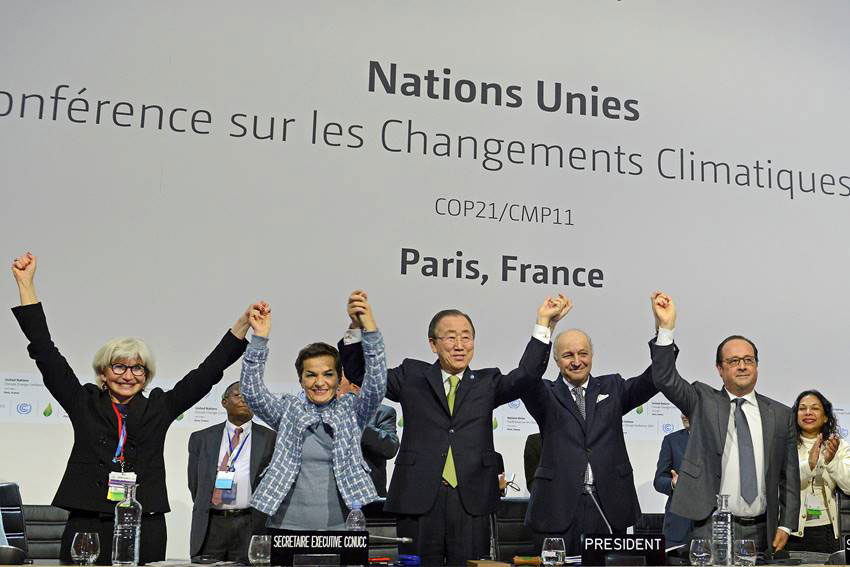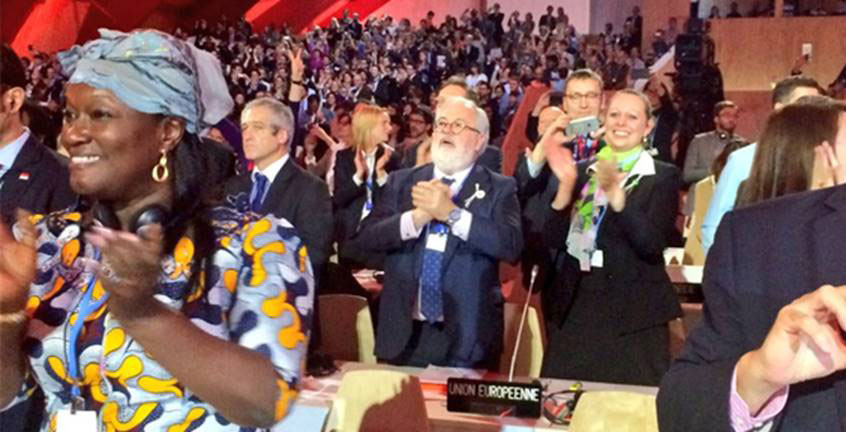“In Paris, there have been many revolutions over the centuries. Today it is the most beautiful and the most peaceful revolution that has just been accomplished – a revolution for climate change.” President Francois Hollande Dr. Mae-Wan Ho

When the President of COP21 French Foreign Minister Laurent Fabius struck the gavel to signal adoption of the Paris Agreement, the thousands of delegates gathered in the hall rose to their feet cheering and applauding. It is hailed a “landmark agreement”, charting a fundamentally new course in decades of international efforts to secure a united front on tackling climate change. In the culmination of a four-year negotiating round, the new treaty ends the strict differentiation between developed and developing countries that had been a major obstacle and a point of contention in earlier efforts. It is replaced with a common framework that commits all countries to put forward their best efforts and to improve on them in years ahead. For the first time, all parties are required to report regularly on their emissions and implementation efforts, and to undergo international review [1].
French President Francois Hollande summed it up [1]: “In Paris, there have been many revolutions over the centuries. Today it is the most beautiful and the most peaceful revolution that has just been accomplished – a revolution for climate change.”

The 21st session of the Conference of the Parties (COP21) to the United Nations Framework Convention on Climate Change (UNFCCC) took place in Paris, France 30 November – 12 December 2015. The full agreement is as follows [1].
The revolution has only just begun. Many operational details remain to be decided by future COPs; and the agreement will take effect only once enough countries have formally ratified it. The Paris Agreement is a treaty under international law, but only certain provisions are legally binding. The United States wanted an agreement that the president could accept without congressional approval; that precluded binding emission targets and new financial commitments. The agreement commits parties to “pursue domestic measures with the aim of achieving the objectives” of its NDC, but does not make the implementation or achievement of NDCs a binding obligation. It also encourages, but does not require countries to develop and communicate long-term low emission development strategies.
It is a victory for small island countries and other countries highly vulnerable to climate impacts that the agreement includes a free-standing provision extending the Warsaw International Mechanism for Loss and Damage. This mechanism, established as an interim body at COP19, is charged with developing approaches to help vulnerable countries cope with unavoidable impacts, including extreme weather events and slow-onset events such as sea-level rise. Potential approaches include early warning systems and risk insurance.
At the insistence of developed countries led by the US, the COP decision specifies that the loss and damage provision “does not involve or provide a basis for any liability or compensation.”
The Paris Agreement will be open for signing 22 April 2016. To become a party to the agreement, a country must then express its consent to be bound through a formal process of ratification, acceptance, approval or accession. It requires approval by at least 55 countries accounting for at least 55 % of global emissions for the agreement to enter into force.
US President Barack Obama hailed the agreement [2] “ambitious” and “historic”, but also warned against complacency. And although admitting the deal was not “perfect”, it was the “best chance to save the one planet we have.” China’s chief negotiator Xie Zhenhua also said the deal was not perfect, but “this does not prevent us from marching historical steps forward.”
Mr Giza Gaspar Martins, chairman of the group representing some of the world’s poorest countries said the agreement was [3] “the best outcome we could have hoped for, not just for the Least Developed Countries, but for all citizens of the world.”
The business community appears to welcome the treaty too. “This agreement establishes a clear path to decarbonize the global economy within the lifetimes of many people alive today,” said Polman, CEO of consumer goods maker Unilever and a leading advocate for sustainable business practices [4]. He said it will “drive real change in the real economy.”
Most climate activists reacted positively. “Whereas we left Copenhagen scared of what comes next, we’ll leave Paris inspired to keep fighting,” said David Turnbull of Oil Change International, a research and advocacy organization opposed to fossil fuel production [4].
However, there are also strong detractors. An assessment published during the two-week talks suggested that the emission reduction currently on the table in the NDCs submitted would only limit global temperature rise by 2.7 °C [2]. Nick Dearden, director of campaign group Global Justice No said it is outrageous to spin the Agreement as a success when it undermines the rights of the world’ most vulnerable communities and has almost nothing binding to ensure a safe and liveable climate for future generations.”
“The United States has hindered ambition,” said Erich Pica, president of the US chapter of Friends of the Earth [5]. “The result is an agreement that could see low-lying islands and coastlines swallowed up by the sea, and many African lands ravaged by drought.”
US Senator James M Inhofe, chair of the Senate Environment and Public Works Committee, pronounced the Paris talks “full of hot air” and vowed to block the White House from using taxpayer money to help carry out the accord. Senate leadership has already said that the US is not legally bound to any agreement setting emission target or any financial commitment to it without approval by congress.
But Secretary of State John Kerry told journalists that the Paris Agreement would survive Republican opposition and he called on Americans to elect as their next president someone who would support strong action on climate change.
Obama made a robust defence against critics who said that the use of renewable energy would be expensive and destroy jobs. Far from killing jobs, he said, “we’ve seen the longest streak of job creation in our history”, with renewable projects creating “a steady stream of middle-class jobs.”
There is no doubt that a positive movement towards green energies and away from fossil fuels has been unleashed in Paris, which will carry the momentum forward far beyond what the official agreement stipulates. This is evident in a whole slew of pledges and initiatives that came out of Paris [1].
Many national governments offered new financial pledges. Altogether, the developed countries pledged $19 billion to help developing countries, including an announcement by John Kerry that by 2020 the US will double its support for adaptation efforts to $800 million a year. Developing countries are also offering support: Vietnam pledged $1 million to the new Green Climate Fund (GCF). And for the first time, subnational governments offered pledges: €1 million from the city of Paris for the GCF and CAD 6 million from Quebec for UNFCCC’s Least Developed Countries Fund.
Governments launched new joint initiatives. India and France led 120 countries in announcing an international Solar Alliance supporting solar energy deployment in developing countries. More than 20 developed and developing nations launched Mission Innovation, pledging to double public investment in clean energy research and development over five years.
At a side summit hosted by Paris Mayor Anne Hidaldo and former New York mayor Mike Bloomberg, the Compact of Mayors declared that the collective commitments of more than 360 cities will deliver over half of the world’s potential urban emission reductions by 2020.
All through the year, France had been encouraging non-state actors to enter pledges on their emission goals into the NAZCA Portal set up under the Lima-Paris Action Agenda. By the Paris meeting, nearly 11 000 commitments were registered from 2 250 cities, 150 regions, 2 025 companies, 424 investors, and 235 civil society organizations.
Also at the Paris meeting, Microsoft founder Bill Gates and 27 other major investors in 10 countries launched the Breakthrough Energy Coalition to direct more private capital into clean energy to combat climate change. The group includes Facebook founder Mark Zuckerman, Head of Virgin Group Richard Branson, founder of Linked in Reid Hoffman and founder of Amazon Jeff Bezos [6]. They’ll concentrate the investments on the countries that are part of Mission Innovation, a consortium of 21 countries including the US, Britain, Australia, Germany, China and Brazil, committed to doubling their investment in clean energy over the next five years. It is expected to bolster governmental assistance in renewables such as solar and wind to $20 bn.
The ‘revolutionary’ Paris treaty was not unanticipated. The Paris summit took place with all the elements and conditions in place for a favourable outcome. A major impetus is the radical change in the global energy landscape within the past 5 years due to the rapid rise of renewable energies and the demise of traditional fossil fuels (see [7] Leave Oil in the Ground, Renewables Can Deliver Climate Solution, SiS 69 - Updated, 22nd Jan 2016). Many pledges to reduce carbon emissions were already made before the Paris summit, plus major boost in finance from unexpected sources, for example [8] China Commits $5.1 Billion to South-South Cooperation on Climate Change and Development (SiS 69). The Paris treaty and the many other outcomes from the summit will make the global shift away from fossil fuels happen much faster than the treaty can be fully ratified.
Article first published 25/01/16
Comments are now closed for this article
There are 2 comments on this article.
Todd Millions Comment left 31st January 2016 18:06:16
The American POTUS,could have grimly amused us all better if his praise had being backdropped by a spewing fault line sited methane storage cavern behind him. The Canadian comment has being framed by whats NOT said with the most expensive grade of perception management.With a foreground of whining of dropping oil prices(because of environmentalists, you know.)which is also useful cover. Since our foreign affairs minister-used to be our environment minister who was used to try to lift the ban on terminator crops 12 years ago.
Todd Millions Comment left 7th February 2016 03:03:51
An elegant example of the -management has come up. I'm unable to make headway on.
Rosatom /Rustatom (recent name change), is reported to have abandoned their Titan-2 (also: Titan ) Nuc power plant project(s) in Finland. No English report comes up and goggle translate is choking on it. Any Finn I could ask for assistance this time of year won't be sober for at least 2 months. There is apparently a comment in the Guardian -which also isn't linking or coming out of search steamers. Some one care to choke some straight answers out of George.M? I would be most obliged.There is of course French involvement too boot. So the same Chinese government firms may be looking to slide in to this "opportunity" to claim their-"Ticket" in this hinkley.
-Seize the Day.